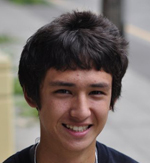Editor’s note: This story was written by a high school student in Northwest Asian Weekly Foundation’s Summer Youth Leadership Program. This story is part of a special back-to-school issue.
By Drew Beland
SYLP STUDENT

Drew Beland
In 1990, there were reportedly more than one million multiracial people in the United States. However, the U.S. Census did not recognize people that belonged to more than one race until 2000.
Throughout history, multiracial people have been discriminated against and have struggled to find their identity. Today, multiracial people are more easily accepted. Still, it is a hard journey for multiracial children to discover what it means to have a multiracial identity.
I am a multiracial Asian American, and these are some of my experiences.
My father is white and my mother is Japanese. This makes me hapa. Hapa is a Hawaiian term that is used to describe a person of mixed Asian, or Pacific Islander, ethnic heritage. More specifically, I am hapa haole, which means that I’m half white.
Growing up, I spent time with my little sister and three cousins on a regular basis. My two older cousins are both full Japanese. My younger cousin is half Japanese and half Chinese. Needless to say, I grew up around a lot of Asian culture.
Even though I’m not racially as Asian as they are, we are all culturally the same because we were raised by the same family with the same traditions and principles. Personally, I end up putting more dominance on my Japanese side. I think this is because I grew up spending more time with that side of my family. I also grew up in Seattle, so I got to experience a lot of Asian culture firsthand.
When I was younger, there were times when I felt like I was left out or didn’t fit in. When my family would go to Asian events, I looked so different than all the other people that were there. When I was a little kid, I always wanted to have black hair like my cousins, and I would cry when my mom told me that my hair was brown. My mom would often tease me about being half white. Even though she did it with love and had no intention of being mean, it still stung a little because to me, it meant that I wasn’t the same as the rest of my family.
As I got older, I embraced my white side more. I have two main groups of friends, my Asian friends and my white friends. I was able to fit into both of these groups because I had experiences from both sides of my family. My white and Asian friends couldn’t always relate to each other because they grew up differently. I often had to hang out with them separately.
It was also interesting to me how I was viewed by both groups of my friends. My Asian friends would jokingly call me “the white guy,” while my white friends would refer to me as “the Asian.” Getting to see both sides of my heritage definitely helped me to understand what it means to have a multiracial identity.
Even though I can speak only from my own experiences, I’m sure that all people of mixed race have felt similar insecurities about their multiracial identity at one point or another. My advice for people, multiracial or not, is to learn as much as you can about both sides of your family in order to get the best understanding of yourself. ♦




I am sympathetic that biracial people have unique struggles but at the same time think that being part white also provides privileges.
Do you think that half white half asians have advantages that full blooded asians do not?
Example – in Hollywood there are part or half Asian male actors that get leading man roles (Keanu Reeves, Dean Cain) but Hollywood refuses to give leading man roles to completely Asian actors. Another example is all the attention that Apollo Ohno gets – if he had been completely Asian but had the same personality and talent I doubt the media would give him much attention. I think this attitude carries over into the rest of our society. I also think that to some extent some part white individuals think that they are better than people that are completely minority.
Would you agree that half white half asians get privileges that half asian half black people do not?